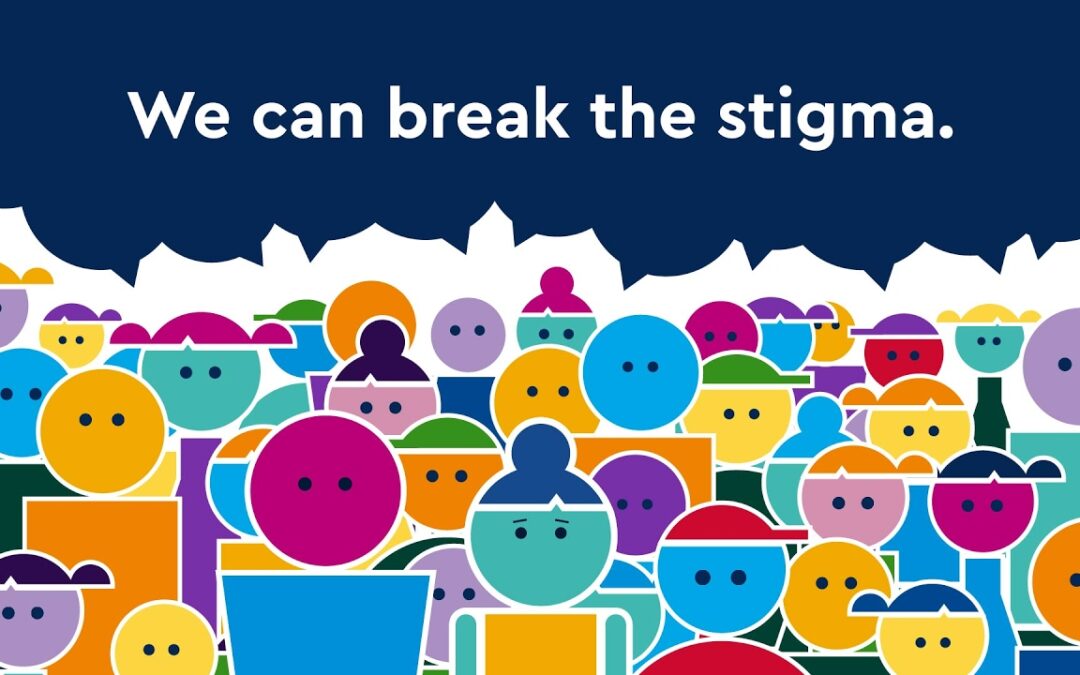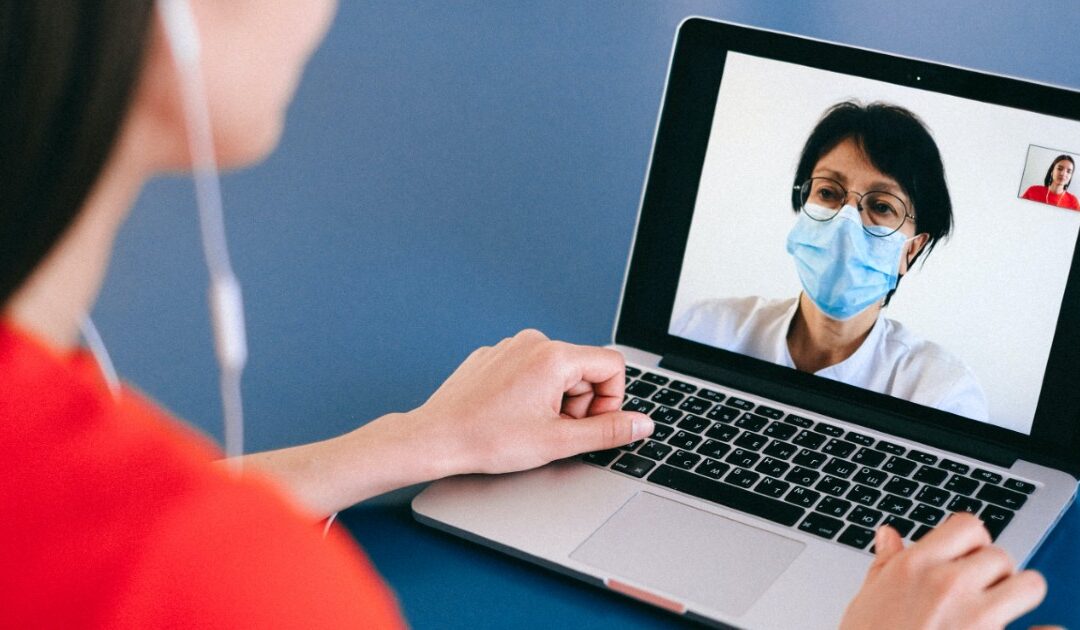
by Page Jennings | Feb 26, 2021 | Tele-Behavioral Health Series
Stigma, defined by the Mayo Clinic as “when someone views you in a negative way because you have a distinguishing characteristic or personal trait that’s thought to be a disadvantage”, is prevalent in the behavioral health field. Many people face stigma before, during and after their journey to improved behavioral health.
According to the American Psychological Association, “More than half of people with mental illness don’t seek help for their disorders. Often, people avoid or delay seeking treatment due to concerns about being treated differently or fears of losing their jobs and livelihood. That’s because stigma, prejudice and discrimination against people with mental illness is still very much a problem.” Additionally, stigma does not only keep many people from ever reaching out for help with their behavioral health, but it can also slow or even reverse the progress that those who do reach out for help have made. People may become embarrassed if their situation with behavioral health becomes known, and it may cause them to stop seeking help from a specialist. Others may not keep up their behavioral health routine of self-care for fear it will make them stand out or be ridiculed.
Stigma for behavioral health is all around us, from the medias portrayal to decreased federal funding for research and development of cures. Stigma can be found in the workplace, at school, within friend groups or even families. Although the problem seems pervasive, there is hope.
Apportis eliminates the feeling of anxiety that someone may see you walking into a behavioral health clinic and the need to ask for time off of work to see a specialist, something many were hesitant to do as they believed it may lead to their boss thinking differently of them. The Apportis platform brings behavioral health to you, with a secure and HIPAA compliant video connection to a case manager or other behavioral health specialist. The platform is loaded with resources that can be browsed from the comfort of your own home. Apportis is an intuitive platform that does not need WIFI, so those of all ages, skill levels, and circumstances can benefit from the extra layer of privacy that Apportis adds to your behavioral health journey. It also eliminates barriers to transportation, childcare, bad weather and even COVID. The main thing Apportis does, however, is allow you to pursue health without the fear of stigma.
Coming from a family of social service providers, I have been exposed to people in crisis my whole life, many of whom were embarrassed to ask for help because stigma is still so prevalent in our society. Looking back, there are many instances I can recall which the Apportis platform would have been invaluable for these people, allowing them to pursue behavioral health care from the comfort, safety and privacy of their own home. Never be embarrassed to ask for help, as it is a sign of strength rather than a weakness. Reach out and see what Apportis can do for you on your path to health.
Author: Page Jennings

by Marissa Ulchaker | Feb 19, 2021 | Tele-Behavioral Health Series
I’d like to familiarize everyone with what tele-behavioral health is so that you can have a meaningful reading experience. Tele-behavioral health is the process of providing behavioral therapy or psychotherapy remotely, utilizing video conferencing or text-based messaging. Millions of people’s mental health needs have been addressed by the means of tele-behavioral health, and I’d like you all to be aware of this valuable resource.
Tele-behavioral health is not subject to any one specific group of people; It is a universal resource. It does not discriminate against geographic location, income level, age, race, ethnicity, gender identity, nor sexual orientation. Tele-behavioral health has become a common tool that can be employed by anyone.
I have many friends that have found relief and guidance in tele-behavioral health resources, especially during the pandemic. Not only can they receive the necessary help they need, but they can do so at a distance. With the technology of tele-behavioral health, my friends who attend college away from home are able to not only maintain but improve their mental health with their primary caregiver. They can easily be connected on their phone, tablet, or computer anywhere to address their emergent needs. College students are just one demographic that can benefit from tele-behavioral health.
You may not know that even our homeless population can access tele-behavioral health support. Specifically, agencies who utilize our Apportis platform can connect tele-behavioral health professionals with homeless individuals as our solution does not need Wi-Fi to function. Oftentimes, these homeless men, women, and children’s mental illnesses are heightened by their stressful living situation, so tele-behavioral health is a vital resource for them to have access to.
At Apportis, we are continuously working with agencies and organizations to help connect tele-behavioral health services with those in need. Tele-behavioral health has become a new norm in our society, and we are here to be a leader in those developments.

by Marissa Ulchaker | Feb 12, 2021 | Tele-Behavioral Health Series
Hopefully you have read our last blog (Tele-Medicine vs. Tele-Behavioral Health), so you understand more about Apportis’s tele-behavioral health platform. We have all had good and bad days that come and go, but there is no reason why a serious long-term mental illness should be left unaddressed. It is no secret that the pandemic has been difficult for everyone. Most of us have experienced isolation, loss, depression, anxiety and even panic and regret. I, too, have felt these hardships, so it is important to know that we are not alone in those feelings.
That is why our Apportis team is dedicated to providing software to agencies that deliver social services and behavioral health. Our platform is easily accessible whether you are a student struggling at home, a farmer experiencing difficulties in your rural community, a homeless individual without a warm shelter, etc. There are no bounds to our efforts to connect with agencies that can help those in need.
Let me provide you with an example of how easily our platform connects people with the services they need:
Older individuals in our population are especially vulnerable during these times of crisis, so many are relying on virtual healthcare and means of communication. An older individual in need of behavioral healthcare can easily be connected with a tele-behavioral health professional through an agency or organization of their choice who utilizes Apportis’s software. They can then receive help from the safety of their own home. This also means they can avoid physical contact with possible infections, including COVID-19, that are spread throughout hospitals and doctors’ offices. Aside from COVID-19, they can also get help safely by avoiding the icy roads and sidewalks that come with winter weather.
That is just one example of who Apportis’s platform can serve. As a college student, it comforts me to know that any university can use Apportis’s software for their students and faculty. I understand the stressful demands that come with earning a college degree, so I encourage universities to utilize our behavioral health resource to care for their students’ health and wellness.
The need for tele-behavioral health has grown exponentially since the development of the COVID-19 Pandemic. Apportis is here to tailor our software platform so that agencies can meet the specific needs of those they serve, including you!

by Marissa Ulchaker | Feb 5, 2021 | Tele-Behavioral Health Series
Tele-medicine and tele-behavioral health have become prevalent terms in society’s everyday life, but what do they mean? The demand for virtual health care options has risen exponentially in recent years, and many of us don’t know the difference between these two terms. In my personal experience, I used to glaze over these terms simply because ‘I had an idea of what they meant.’ However, knowing what they are has proven to be of value because I can make educated decisions about my family’s and my necessary care.
Tele-Medicine: “Medical care provided remotely to a patient in a separate location using two-way voice and visual communication (as by computer or cell phone)” (Merriam-Webster.com Dictionary)
Tele-Behavioral Health: The process of providing behavioral therapy or psychotherapy remotely, utilizing video conferencing or text-based messaging
Essentially, tele-behavioral health is a sub-category of the broader tele-medicine scope. It focuses more directly on behavioral health disorders, such as anxiety, depression, and PTSD to name a few. The National Institute of Mental Health reports, “In 2019, there were an estimated 51.5 million adults aged 18 or older in the United States with AMI (a mental illness). This number represented 20.6% of all U.S. adults” (National Institute of Mental Health). I have tried my best to help my friends with their mental health challenges – but sometimes a friend’s loving advice just isn’t enough.
As a result, the importance of tele-behavioral health has grown with the increasing prevalence of mental health challenges and substance use disorders around the world. This form of healthcare can be accessed by anyone to provide them with the critical help they need.
At Apportis, we provide a HIPPA-certified tele-behavioral health platform to communities in need. Our software removes barriers to connect counselors, case managers, caregivers, and clinicians to those in need, and it provides that community with resources to thrive. Anyone can receive behavioral health advice through the Apportis software without the need of Wi-Fi. This means that we can assist those in urban, rural, and even homeless communities for their behavioral health needs.
We encourage everyone to learn more about tele-medicine and tele-behavioral health because we understand that everyone lives with their own challenges. You can read more blogs about the previously mentioned topics, in addition to various other health-related subjects, on our website Apportis.com under the “BLOG” tab. We would love to assist you with your behavioral health needs, so please contact us with any inquires and questions you may have. We can make an impact together in tele-behavioral healthcare!
National Institute of Mental Health. “Mental Illness.” National Institute of Mental Health, U.S. Department of Health and Human Services, Jan. 2021, www.nimh.nih.gov/health/statistics/mental-illness.shtml.
“Telemedicine.” Merriam-Webster.com Dictionary, Merriam-Webster, https://www.merriam-webster.com/dictionary/telemedicine. Accessed 31 Jan. 2021.





Recent Comments